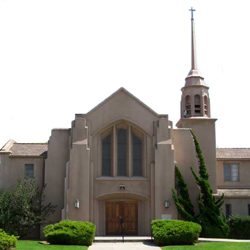“Stone Soup (Immigration and Border Justice)”
A meditation based on a variety of scriptures about welcoming strangers:
Leviticus 19:33-34, 24:22; Deuteronomy 24:17-18, 21-22; Hebrews 13:1-2
August 19, 2018
Community Congregational Church of Chula Vista
Dr. Sharon R. Graff
* * * * *
The library of 66 separate books that we know as the Bible is unwavering about this one thing: we are to treat the stranger, the foreigners—aliens, the Bible often calls them—we are to treat them as we would a native born person, with the same rights and privileges as citizens. There is to be no difference. Obviously, most countries that adhere to the Judeo-Christian mission, including our own, fall far short of that goal. So today’s message is a wonderful and timely reminder from our beloved United Church of Christ—a reminder of the ideal which God calls us to practice—it is the ideal of living God’s justice at the border and embodying God’s justice with immigrants. Serious stuff, especially in our day and in this geographic location so near an international border.
To help you visualize and imagine how you can practice immigration and border justice—as individuals and as a congregation—I invite you to hear the children’s story entitled, “Stone Soup.” This lovely story shows how you can grasp this very large topic and still find small but significant ways to be faithful to your calling from God to welcome the stranger, to practice international hospitality. Sit back, relax, try to put aside the current news about these matters, and hear this story through your own loving heart and your compassionate mind. Hear how you might be part of the solution…
Three monks—Hok, Lok, and Siew—traveled along a mountain road. They talked about cat whiskers, the color of the sun, and giving. “What makes one happy Siew?” asked Hok, the youngest monk. Old Siew, who was the wisest, said, “Let’s find out.”
The sound of a bell brought their gaze to the rooftops of a village below. They could not see from so high above that the village had been through many hard times. Famine, floods, and war had made the villagers weary and untrusting of strangers. They had even become suspicious of their neighbors.
The villagers worked hard, but only for themselves. There was a farmer. A tea merchant. A scholar. A seamstress. A doctor. A carpenter…and many others. But they had little to do with one another.
When the monks reached the foot of the mountain, the villagers disappeared into their houses. No one came to the gates to greet them. And when the people saw them enter the village, they closed their windows tight. The monks knocked on the door of the first house. There was no answer. Then the house went dark. They knocked on a second door and the same thing happened. It happened again and again from one house to the next.
“These people do not know happiness” they all agreed. “But today,” said Siew, his face bright as the moon, “we will show them how to make stone soup.” The monks gathered twigs and branches and made a fire. They placed a small tin pt on top and filled it with water from the village well. A brave little girl who had been watching came to them, “What are you doing?” she asked. “We are gathering twigs,” said Lok. “We are making a fire,” said Hok. “We are making stone soup and we need three round, smooth stones,” said Siew. The little girl helped the monks look around the courtyard until they found just the right stones. Then they put them in the water to cook. “These stones will make excellent soup,” said Siew, “but,” he continued, “this very small pot won’t make much I’m afraid.” “My mother has a bigger pot,” said the girl.
The little girl ran home. As she started to take a pot, her mother asked what she was doing. “The three strangers are making soup from stones,” she said. “They need our biggest pot.” “Hmmm,” said the girl’s mother. “Stones are easy to come by. I’d like to learn how to do that!” The monks poked the coals. As smoke drifted up, the neighbors peered out from their windows. The fire and the large pot in the middle of the village was a true curiosity! One by one, the people of the village came out to see just what this stone soup was. “Of course, old-style stone soup should be well seasoned with salt and pepper,” said Hok. “That is true,” said Lok as he stirred the giant pot filled with water and stones. “But we have none…” “I have some salt and pepper!” said the scholar, his eyes but with curiosity. He disappeared and came back with salt and pepper and even a few other spices.
Siew took a taste. “The last time we had soup stones of this size and color, carrots made the broth very sweet.” “Carrots?” said a woman from the back. “I may have a few carrots! But just a few.” And off she ran. She returned with as many carrots as she could carry and dropped them into the pot. “Do you think it would be better with onion?” asked Hok. “Oh, yes, maybe an onion would taste good,” said a farmer, and he hurried off. He returned in a moment with five big onions, and he dropped them into the bubbling soup. “Now, that’s a fine soup!” he said. The villagers all nodded their heads, as the smell was very agreeable. “But if only we had some mushrooms,” said Siew, rubbing his chin. Several villagers licked their lips. A few dashed away and returned with fresh mushrooms, noodles, pea pods, and cabbages.
Something magical began to happen among the villagers. As each person opened their heart to give, the next person gave even more. And as this happened, the soup grew richer and smelled more delicious. “I imagine the Emperor would suggest we add dumplings!” said one villager. “And bean curd!” said another. “What about cloud ear and mung beans and yams?” cried some others “And taro root and winter melon and baby corn!” cried other villagers. “Garlic!” “Ginger root!” “Soy sauce!” “Lily buds!” “I have some! I have some!” people cried out. And off they ran, returning with all they could carry. The monks stirred and the pot bubbled. How good it smelled! How good it would taste! How giving the villagers had become!
At last, the soup was ready. The villagers gathered together. They brought rice and steamed buns. They brought lychee nuts and sweet cakes. They brought tea to drink, and they lit lanterns. Everyone sat down to eat. They had not been together for a feast like this for as long as anyone could remember. After the banquet, they told stories, sang songs, and celebrated long into the night. Then they unlocked their doors and took the monks into their homes and gave them very comfortable places to sleep.
In the gentle spring morning, everyone gathered together near the willows to say farewell. “Thank you for having us as your guests,” said the monks. “You have been most generous.” “Thank you,” said the villagers. “With the gifts you have given, we will always have plenty. You have shown us that sharing makes us all richer.” “And to think,” said the monks, “to be happy is as simple as making stone soup.”
(Leviticus 19:33-34, 24:22)
God says, “When foreigners live with you in your land, don’t take advantage of them. Treat the foreigner the same as a native. Love them like one of your own. Remember that you were once foreigners in Egypt… no double standards: the same rules go for foreigners and natives. I am God, your God.”
(Deuteronomy 24:17-18, 21-22)
God says, “Make sure foreigners and orphans get their just rights. Don’t take the cloak of a widow as security for a loan. Don’t ever forget that you were once slaves in Egypt and God, your God, got you out of there. I command you: Do what I’m telling you…When you shake the olives off your trees, don’t go back over the branches and strip them bare—what’s left is for the foreigner, the orphan, and the widow. And when you cut the grapes in your vineyard, don’t take every last grape—leave a few for the foreigner, the orphan, and the widow. Don’t ever forget that you were a slave in Egypt. I command you: Do what I’m telling you.”
(Hebrews 13:1-2)
Let mutual love continue. Do not neglect to show hospitality to strangers, for by doing that some have entertained angels without knowing it.
May God give us the courage to live these commands, with love, with creativity, with compassion, with trust in God that all we have is all we need, and what we have received—in God’s economy—are gifts for us to share with others.
Amen and Blessed Be

